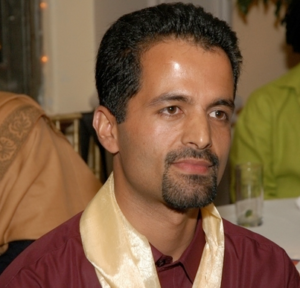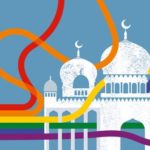Belief, Culture and Activism: an Activist’s insight
Sunil Pant <pantsunil@gmail.com>
May 12.2017
Dear Friends,
As International Day Against Homophobia and Transphobia (IDAHOT 2017) is approaching, I wish to share a small write up based my experience during my time with Blue Diamond Society, (similar thoughts I shared at the recent YP10 conference in Bangkok and South Asia Development conference in London late last month). Hope you find this read interesting. The aim is not say any particular culture good or bad, right or  wrong as they all have positive sides as well as negative, rather help to open up our minds and help to contextualize our activism (or any business for that matter). I appreciate your comments, feedback or questions.
wrong as they all have positive sides as well as negative, rather help to open up our minds and help to contextualize our activism (or any business for that matter). I appreciate your comments, feedback or questions.
Happy IDAHOT 2017
Sunil Pant
Sunil Babu Pant is the first openly gay politician in Nepal. He is one of five members from the CPN party in the constituent national assembly, and was Founder and Director of the Blue Diamond Society until 2013, a gay rights group in Nepal.
******************************************************************
Belief, Culture and Activism: Activist’s insights
When people facing oppression join together in common cause to fight for our human rights, invariably we find ourselves in conflict. Understanding the intersection of our efforts with our culture and society reveals much. One unfortunate incident helped us to understand the more prevalent cultures of Nepalese societies, decode the beliefs that shape the cultures and the way authorities behave toward us, our own behaviors and the way we can shape our activism.
Since 2001 Blue Diamond Society (BDS) has run a small HIV prevention program with a drop in center in Kathmandu. BDS also focused on was addressing human rights violations against the LGBTI populations on ‘ad-hoc’ basis.
In early years of BDS, during the monsoon, in the month of late June, one Third-gender from the eastern Terai region (southern plain of Nepal, bordering India) was sent to Blue Diamond Society in Kathmandu for treatment. This was the first time we had to deal with Teku Hospital, then, the only hospital which looked after HIV+ people in Nepal. She was sent for suspected HIV infection (possibly already Aids) from the district hospital. She was tested HIV+, the doctors diagnosed her of having Aids. She needed to be hospitalized and was referred by the doctor for admission. The inpatient department was reluctant to admit her because they found a technical problem due to her ID and her gender appearance.
The hospital segregated males and females into separate ward. Both wards refused to admit her. After hours of negotiations and reminding them of the Hippocratic Oath, the hospital admitted her in a male ward. Another transgender friend from BDS remained with her to look after her during the night, but as soon as we left, she (the TG with HIV) was pushed out from that ward and spent the night in a corridor.
Next day when we went to talk to the hospital management team, they said that the other patients from the ward complained and they had to put her in the corridor. So they agreed to admit her in female ward. After we left, the same story repeated; the TG with HIV was pulled into the corridor from the female ward too. We never fully resolved the problem then, and after few days, the TG died.
Her body was denied to us for the cremation (according to Hindu tradition) as we needed authorization from her family (who disowned her long ago). It took two days to get the fax from her family for authorization. We contacted the transport ambulance for her remains, but they also refused to take the already rotten body, We were forced to arrange a taxi with high fare to bring the body to a cremation site.
We reached the cremation site near Pashupati temple where most of the Hindus in Kathmandu take their loved ones who have passed away. The priest refused to cremate and refused to assign a cremation spot either for the dead body of TG saying they could not allow TG to be cremated in that holy cremation ground. It was pouring rain all night and no agreement could be made, so really-early morning, we got another taxi, transporting her to another cremation ground (less preferred, as considered less holy by many Hindus) in Teku area of Kathmandu.
About 50 community members, mostly TGs and a few gay men, gathered by then, that morning, in Teku. The challenge still remained to find a priest who would perform the last rite rituals and finding a cremation spot. Some TGs started crying not only for the TG friend who had passed away but also for themselves, saying: “We will have the same fate, nobody from our family will join our last rite, no priest will perform out last rituals, we will die like street dogs of Kathmandu, in the street, rotten and be disgusted. Everyone would spit on our dead body…..”
That really was an emotional moment, realizing that we were not only materially deprived, we were not only intellectually discriminated against, but, most importantly, we were also emotionally disempowered. It was sad but I was relieved to realize the root of the problems that we were/are facing, the emotional marginalization. We get bullied from early age, face degrading treatment, abuse, rape, physical violence, exclusion, name calling etc. These are all tactics of emotional disempowerment, emotional marginalization. It’s the emotional resources (or lack thereof) that is deep rooted ‘within them’ and ‘within us’; and only later it manifests as intellectual problems (or if positively, as intellectual resources) and material ones.
For the material resources, which one earns/accumulates mutually from the outside world, one has to depend on others. The intellectual resources, which one learns/earns from within and the world outside, one has to rely partially on others. On the other hand emotional resources, which one discovers from the within, one has to rely on oneself only; one has to realize oneself and figure out who s/he actually is. This, the revelation of all the resources, we use on day to day basis, we all have within us and around us, was nothing short of Enlightenment.
We started figuring out the immediate solutions and the plans for the long term.
I told the gathered community members that ‘don’t worry, even if we don’t find a priest I will perform the ritual as a Bramhim (not that I am from practicing priest family but form surely belong to priestly caste) son, we will conduct the ritual one way or the other, don’t worry’.
We not only found a young priest who agreed to perform the last rituals for that TG, but also the temple in Teku agreed to permit the long awaited cremation. That last rite ritual performance not only gave the sense of family of the community within but prevented each one of from ’emotional draining and deepening low self-esteem’. I could see a renewed energy and faith within the community; that was remarkable. It was even more remarkable when we realize the fact that, we may be suffering from fear, anxiety and low self-esteem but, the other side too, to whom we often call “perpetrators”, are even more suffering from the hatred against us. They are burning continuously with the fire of hatred within them. They are victims too. This realization changed our perception the way we look at them. Then onward, we see them not as perpetrators but victims of their own psychology
From that year onward, the LGBTIQ community started celebrating more than 500 years old festival, the Gaijatra Festival, where traditionally the families bring out (rather colorful and humorous) procession in memory of those loved one who have passed away in the last year; emotional investment into the hearts of LGBTIQ communities in Nepal to feel not only coming together as a family but also to feel good about ourselves and celebrate life while remembering those souls that have passed away.
After that, it was not difficult for us to figure out what kind resources, among the material, intellectual and emotional ones, are required to deal with particular organization/authority based on their behaviors which is shaped by their culture and the particular culture is shaped by their belief. Looking at their cultures, we saw, in Nepal there are primarily 4 different kinds of organizations/authorities: 1) Alpha male-based cultural organization/authority (organization/authority who are control freaks and they do anything to gain control, their only goal is to remain in the top powerful position or if they are not in the top, replace those at top by any means, eg. most of the political parties of Nepal etc). In our initial visits to political parties to lobby them to support LGBTIQ rights, every political party, without exception, asked us: How many people were/are you in Nepal from LGBTIQ community? They are interested in the vote bank. Their goal is achievement and/or control.
2) Devotee-based cultural organization/authority (such organizations/authority based on one authority figure at the top and all the others under him/her has to follow the order, (e.g., Nepal Police, etc.). In our frequent visits to police stations trying to release detained transgender or gay men, the police often say: “Sir, we can’t do anything, we only follow the order from our boss, please talk to our boss”. For such organizations, order from the higher author only matters, nothing else. The authority figure are interested upon your compliance/defiance of their orders and they can award or punish accordingly.
3) Justice-based cultural organizations/authorities (such organizations/authorities behave based on stipulated rules, traditions, norms. Their goal is to make the world orderly and just (e.g., some courts in Nepal, national human rights commission, etc.). For them, having legal evidence is important to determine whether and where justices or injustices are taking place or not.
4) Karma-based cultural organizations. It’s hard to find organizations these days (except few religious organizations like Hindu/Buddhist Ashrams, Ashrams for old age people usually affiliated with a temple, but also many Gurus and Monks who are already in the path of Nirbana propagate this, Karma, culture) that are karma-based culture, but almost all (Nepali?) individuals in general and also as authority are influenced by karma-based culture. Karma-based culture does not necessarily believe in an orderly world, rather they believe on enhancing their good human qualities from within for others, so the justice and equality are not the goal per se, but can be accepted as by-products of conducts of enlightened ones). Enlightenment is their primary goal. For such culture, introspection into one’s mind and conduct is the way onward.
These are oversimplified/generalized classifications of organizations as it’s more complex than this as each may interweave or overlap with the others. Each organization/authority has more than one cultural influence. For example, most of the modern governance, judiciary, business, political organizations of Nepal have a justice-based cultural framework (not necessarily the ‘mindset’) as these organizational models are copied from the western organizational models (modern western organizational models are mostly justice-based or but some can behave like alpha-male-based culture or devotee-based cultures, influenced from Greek or Abrahamic beliefs), whereas people working in these organizations in Nepal, as an individual, have karma-based cultural mindset (karma-based culture is from eastern beliefs, which is derived from Buddhism, Hinduism and Jainism, also devotee-based culture can be found derived from Hinduism).
Based on organizational cultures and individual’s mindset, one can wisely use the different resources they have, the materials, intellectuals and emotional ones. Material and intellectual wealth is somehow easier to figure out, whereas emotional wealth is more difficult to figure out. All the ancient wisdoms reveal that material wealth is important but intellectual wealth is more important than the material ones; whereas, emotional wealth is far more important than these two other ones. For example if you have $1 worth of material resources and I have also $1 worth of material resources, we exchange them and we both end up with $1 each worth of resources. On the other hand if you have 1 idea and I have 1 idea, we both exchange them, we both end up having two ideas on both sides.
And if one person is emotionally empowered s/he can inspire the whole community, the whole country and help make the movement successful for the larger good. Some may think emotional wealth is just about being passionate and committed to the cause, believe me, it’s much more than that. It’s more about figuring out who you are, i.e., are you dominated by your fear, anxiety, jealousy, hatred or are you filled with courage compassion, contentment, friendship and equanimity? How can one find balance among these conflicting emotions and nurture the more beneficial aspects of being?
Blue Diamond Society is still carrying out activities and activism-based on these realizations. We had good working relationships with our donors (who were/are always from the ‘West’), we learn from them allot but we did not always agree with their expectations and the way they wanted we plan and execute strategies, nether they always agreed the way we carried our activism. We didn’t make it clash of civilizations but understood as cultural differences. Whether the 2007 Supreme Court’s petition against government or contesting national elections or organizing beauty pageants or hosting TV shows and radio programs or organizing leadership programs to LGBTI communities or media sensitization programs or protest/rally programs or celebrating same-sex marriage ceremonies or commemorating death or celebrating difference festival or encouraging income generating skill building programs; or going table after table, department after department and officer after officer while working with government to secure LGBTIQ friendly policies and programs; all are based on that understanding, based on that realization of links between the beliefs, cultures and activism.
There are methods activists/organizations can generate these resources and become materially prosperous, intellectually wise and emotionally strong and contented.
Thank you.

















